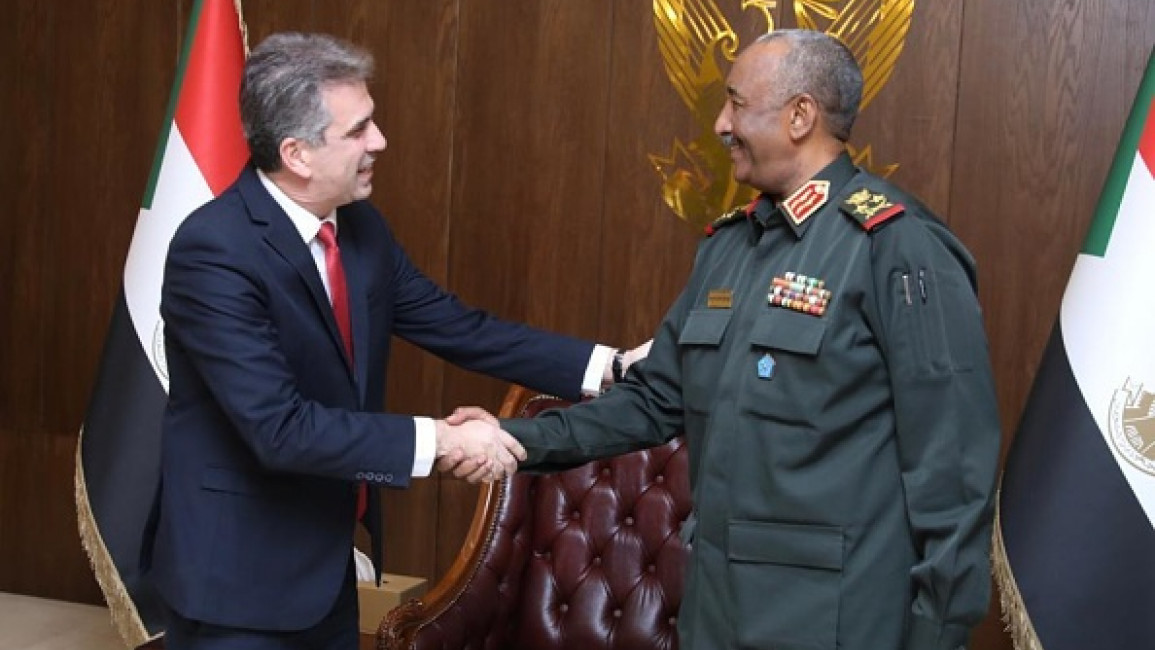Sudan, Israel agree to move forward with controversial 'normalisation' deal
Sudan and Israel said they agreed on Thursday to move towards normalising relations during the first official visit by an Israeli foreign minister to Khartoum.
Sudan in January 2021 formally agreed to normalise relations with Israel in a quid pro quo for the United States removing it from its list of "state sponsors of terrorism", but ties were never formalised.
Israel's Foreign Minister Eli Cohen, then the intelligence minister, led that same month the first official delegation to the Arab northeast African country.
In 2020 the United Arab Emirates, Bahrain and Morocco all normalised relations with Israel as part of the US-brokered Abraham Accords, in a move that sparked near-unanimous condemnation from the Palestinians, as well as the majority of the Arab public, according to opinion polls.
"It has been agreed to move forward towards the normalisation of relations between the two countries," the Sudanese foreign ministry said following a meeting on Thursday between Cohen and Sudan's acting foreign minister Ali al-Sadiq.
Cohen also met with Sudan's army chief Abdel Fattah al-Burhan.
The pair discussed "ways to establish fruitful relations" between the two countries and "prospects of cooperation" in areas including security and energy, according to a statement by Sudan's sovereign council.
Upon his return from Khartoum, Cohen said the two countries had agreed to work towards a "peace agreement".
Normalisation deals between Arab states and Israel have been described as a "stab in the back" by Palestinians, as Israel continues to occupy the West Bank and east Jerusalem, besiege the Gaza Strip and inflict deadly violence.
At least 35 Palestinians have been killed by Israeli forces this year, with many more injured.
Thursday's talks touched briefly on "achieving stability and peace between Israel and the Palestinians", the Sudanese statement said, without elaborating.
Sudan, an Arab League member, had for decades maintained a rigid anti-Israel stance under longtime autocratic president Omar al-Bashir, who was ousted in April 2019 following mass protests against his rule.
Khartoum was removed from the US terrorism blacklist in December 2020 after 27 years of crippling sanctions which strangled Sudan's economy under Bashir.
In January 2021, Sudan signed a declaration paving the way to normalising ties with Israel, and in April that year, it approved a bill abolishing a 1958 boycott of the country.
Relations were however stymied as political turmoil in Sudan deepened following an October 2021 military coup led by Burhan, derailing the post-Bashir transition to civilian rule.
Foreign Minister Cohen said he expects relations to be formalised by the end of the year, but not before Sudan appoints a civilian government to replace Burhan's caretaker military regime.
"During the visit, a draft was relayed of the peace agreement, which is expected to be signed after the transfer of power to the civilian government," Cohen said.
Sudan's agreement to normalise relations with Israel upended a longstanding policy after the 1967 Arab-Israeli War that saw Israel illegally occupy large swathes of territory including the West Bank, the Gaza Strip, and the Golan Heights.
Arab leaders gathered in Khartoum after the defeat, announcing a resolution that became known as the "three nos": no peace, no recognition and no negotiations with Israel.
Egypt and Jordan would later recognise Israel through peace treaties signed in 1979 and 1994, followed decades later by the controversial US-brokered Abraham Accords.
Burhan has justified the normalisation with Israel, saying in a December 2021 interview that it was "essential for Sudan to return to the international community".
Israel's Prime Minister Benjamin Netanyahu, who returned to power late last year at the head of the most extreme government in the country's history, has made broadening Israeli ties across the Arab and Muslim world a foreign policy priority.
Netanyahu has repeatedly expressed his desire to see Saudi Arabia join the Abraham Accords. However, Riyadh says that it refuses normalisation with the country until a state for the Palestinians is established.
Prince Faisal bin Farhan Al Saud, the Gulf kingdom's top diplomat, said last month that "true normalisation and true stability will only come through giving the Palestinians a state".
On Thursday, Chadian President Mahamat Idriss Deby Itno opened his majority-Muslim country's embassy in Israel, four years after the countries renewed ties following a decades-long rupture.
Netanyahu's office in a statement called the embassy's controversial inauguration in Ramat Gan near Tel Aviv "a historic moment". The move, however, was widely condemned by Palestinians.



